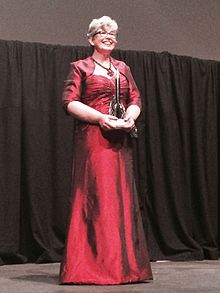Ann Leckie
American science-fiction author
Ann Leckie (born March 2, 1966) is an American author and editor of science fiction and fantasy.

Quotes
editAncillary Justice (2013)
edit- All page numbers from the trade paperback first edition published by Orbit Books
- You might also see why it seemed a bit odd, to Radchaai ears, to hear someone who believed gravity wells were the land of the dead call people superstitious for worshiping a lizard.
- Chapter 4 (p. 54)
- I don’t confuse abstract philosophical concepts with reality.
- Chapter 4 (p. 54)
- You don’t like me saying that, but here’s the truth: luxury always comes at someone else’s expense. One of the many advantages of civilization is that one generally doesn’t have to see that, if one doesn’t wish. You’re free to enjoy its benefits without troubling your conscience.
- Chapter 4 (p. 63)
- Without feelings insignificant decisions become excruciating attempts to compare endless arrays of inconsequential things. It’s just easier to handle those with emotions.
- Chapter 6 (p. 88)
- Her respectful tone sounded almost sincere.
- Chapter 8 (p. 117)
- What, after all, was the point of civilization if not the well-being of citizens?
- Chapter 8 (p. 121)
- People often think they would have made the noblest choice, but when they find themselves actually in such a situation, they discover matters aren’t quite so simple.
- Chapter 10 (p. 145)
- If you’re going to do something that crazy, save it for when it’ll make a difference. But absent near-omniscience there’s no way to know when that is. You can only make your best approximate calculation. You can only make your throw and try to puzzle out the results afterward.
- Chapter 10 (p. 153)
- It’s easy to say that if you were there you would have refused, that you would rather die than participate in the slaughter, but it all looks very different when it’s real, when the moment comes to choose.
- Chapter 11 (p. 155)
- “Now I’m going to make you angry again.”
“Really?” I asked, drily. “Aren’t you getting tired of that?”- Chapter 15 (p. 232)
- We have a saying where I come from: Power requires neither permission nor forgiveness.
- Chapter 19 (p. 299)
- “Not safe?” I asked, all innocence. “Surely it isn’t illegal here to complain about young people these days? How cruel. I had thought it a basic part of human nature, one of the few universally practiced human customs.”
- Chapter 20 (p. 315)